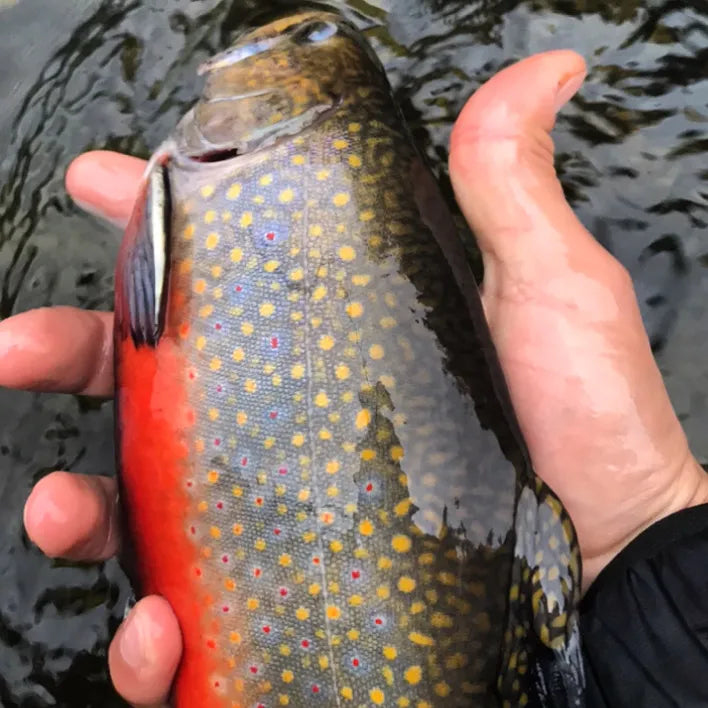
A Philosophy of Change
I always found political parties attacking each other for flip flopping ideologies between decades amusing. Candidate X voted this way in 1995, now look at them, they can’t be trusted! Politicians, America’s top comedians. I know that as time has passed, I have changed my philosophies, my outlook, my ideologies, my understanding. New evidence surfaces, we digest, and our beliefs and understanding are continually evolving. It would only be fitting that this philosophy of change applies to all things we have become passionate about, including fly fishing. For instance, I use to consider MDIFW gods that could do no wrong. Now, I frequently butt heads with their fisheries decision making, such as changing Big Reed Pond to ALO and allowing Arctic Char to be kept. But what about the subtler topics, the way we perceive fishing or angling decisions? Do those change? What if the answer to my angling question has no logical information feed, stalling the molding of our understanding?
I was around 18 when I found my favorite fly, that changed when I was 19, and changed again when I was 20. Now, at 29, I have about 8 million favorite flies. Does having a favorite fly actually cause you to catch more fish? What a crazy nuance to think about, that somehow your emotional connection to a fly could cause more fish to land in your net. I would have told you that’s crazy 10 years ago, now, I whole heartedly believe it’s true. So, there exists an endless amount of these scenarios that my opinion has either changed or altered over the years, but one question remains unanswered. One aspect of fly fishing I can’t change my philosophy on because I haven’t come up with an answer or even a guess. Let me lay a scenario out to explain:
You stumble up to your favorite trout hole. You know there are fish there and you know what flies typically land fish. You reach in your vest, tie on your favorite caddis nymph trailing a bushy elk hair dry. You cast and you cast and you cast some more. Conditions are perfect, but no fish are looking your way. In frustration and begrudgingly, you change your trailer to a smaller midge pattern. On the first cast, WAM-O, a monster 20” brook trout comes to hand. You say to yourself; wow am I glad I changed flies. You go about the rest of the day happy as a clam.
The philosophy of changing a fly is a slippery slope. Was it the change of the fly that created success? What if you had thrown your initial set up one more time, would that brook trout have come to hand or would you still be fishless? The question does changing your fly even matter has plagued me for years.

Most people at this time will say, of course it matters, I don’t know how many times I’ve changed my fly and caught a fish immediately after. This may be true, changing flies may matter, but is there proof? Is there a logical explanation? I believe that it falls under the category of feelings, not facts. To counter the previous argument, I was nymphing a popular stretch on a river in Northern Maine. On what felt like my 100th cast, using the same set-up, in the same drift, I landed a large 20” salmon. Now, why did it take 100 casts? If I had switched flies earlier, might I have caught this fish earlier or am I changing flies too quickly? Should I be more trusting in the patterns I am throwing?
Fish undoubtedly eat many things throughout the day, what is it that makes them bite? Do fish see a fly and remember it? If they can remember, from the fish’s perspective, it would go something like this, “there’s that fake food floating by again, I shouldn’t eat that.” That train of thought is laughable to me, I feel as though fish don’t have time to think about things of this nature. Are we as anglers better off changing our tippet size as opposed to switching our fly?
My only concrete thought on the process is, if you are given 60 mins to fish a stretch of water and do not switch flies, you can fish that stretch for 60 mins, maximizing the amount of time your fly is in the water. An increase in fly/water contact theoretically will increase the probability of catching a fish (under the assumption that the fly is historically successful). By spending 10 mins switching flies, you decrease your fly/water contact, in turn lowering your probability of catching a fish. Logically, this makes sense, but again, the original question doesn’t even seem based in logic.

As I write what is essentially a stream of consciousness, I always end up at this point, there is no definitive answer. This frustrates me tremendously, as the answer would directly impact my strategy on the river. My ultimate fly fishing goal is to become the best angler I can be. Maybe the answer, as the Supreme Court Justice Potter Stewart once said is, I know it when I see it. Evidence that is non-tangible, unprovable. Of all the great philosophical debates without concrete answers, this one plagues me the most. Maybe I should just accept the fact that the great question to change my fly or to not will never be answered definitively. I want to accept it, I want to just move on, there is no answer, but I know, deep down inside, I will not. I will forever be torn, deep in thought on the river’s edge. Should I change this fly or not?
